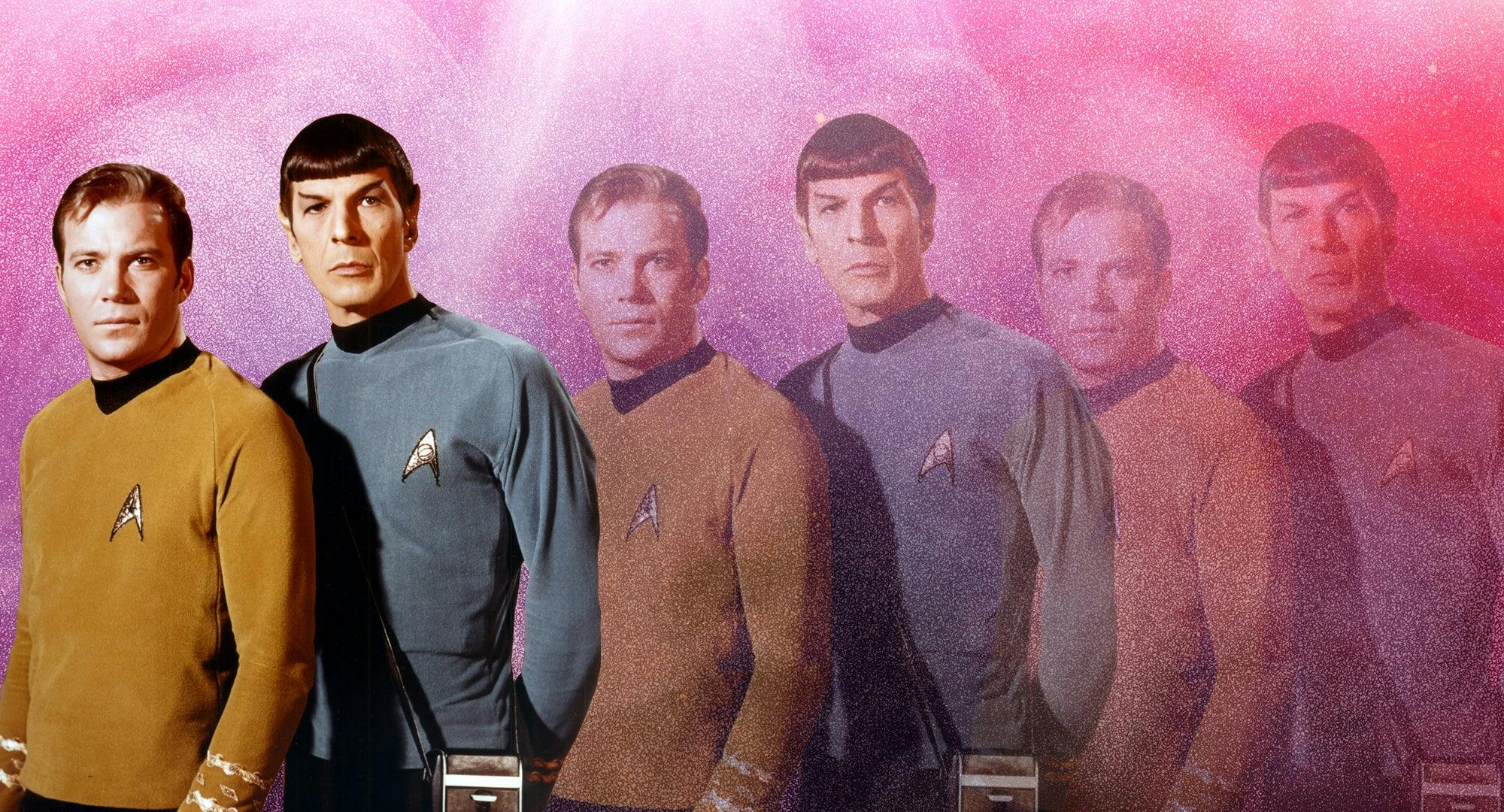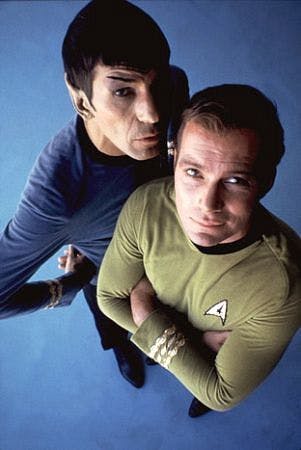Published Oct 17, 2019
When You Live With Memory Loss, Each Star Trek Rewatch Can Feel Like the First
"Star Trek didn’t begin to live in my body in this time of forgetting. It’s lived in all of our bodies since 1966."

StarTrek.com
When I had my bipolar onset ten months ago, my body did me what it considered to be a favor and erased my emotional memory. It’s a sensible trauma response — bodies don’t thrive on trauma, so they do what they can to pretend there is none. There are some instances of my bipolar onset that I don’t remember at all. Some come back when I’m reminded. Often, I can tell you where I was and what I was doing and even what I was feeling, but it’s like I’m reading a book. I can’t feel the memory at all.
Which means that I don’t remember how this story starts, aside from that my friend had been trying to get me to watch Star Trek: The Original Series for years. She’d been with me through the most difficult days of my bipolar onset, and she might have told me that this was the perfect moment for me to start. Or, perhaps I’d wanted to watch to thank her for the care work she’d done. On the other hand, it could have just been the natural progression of our TV friendship. Maybe there was no single answer, and maybe it doesn’t matter, and regardless I can’t know.

StarTrek.com
I do know this: My friend was aware that I love new things and that I almost never start them of my own accord, so she sat me down in front of her TV and hit play on “The Naked Time.” The next thing I remember is watching “The Naked Time” alone on the floor of my new apartment. Long enough must have passed that I’d decided to watch it again, though I know I didn’t recognize it until about halfway through. My roommates hadn’t brought their furniture yet and I’d fashioned a chair out of two lumpy pillows. I so clearly remember Spock crying. “Jim, when I feel friendship for you, I’m ashamed.” Spock was infected with a de-inhibiting illness, something forcing hidden secrets to the surface.
I am gay, trans, and disabled, and I know the dance of loving in spite of a culture designed to shame me. I don’t remember crying in my friend’s apartment when I first heard that line, but I know I cried in mine.
My friend has some exquisitely constructed theories about Spock and Kirk’s relationship. Sometimes, she’ll take me through them. She is an excitable, loud talker, and over the past few years I’ve spent many hours listening to her theories, stopping her every so often to ask questions or challenge something or, when necessary, make fun of her. I lose them early in, now. They often start with Spock’s line which resonated so greatly with me, yet each time I have to reteach myself where it’s from.

StarTrek.com
When we talk, I close my eyes and wait for the memory to return, trying to understand why it made me feel something. By the time I’ve figured it out, I’m three points behind. She would stop if I asked, remind me about each thing I’ve forgotten. But if I stopped her every time I dropped something, we’d never finish a theory, and I’d rather know the end. Since my bipolar diagnosis, I’m getting used to learning in fits and starts, clinging onto phrases and trying to pack ideas into a body that’s trying to push them out.
Of course, my friend is not a monologist. She doesn’t want me to shut up and listen, she wants me in it with her. And I am, sometimes. I have become a detective of my own memory. When she brought up Spock’s line “I have a responsibility to this ship, to that man on the bridge,” I Googled to figure out that it was from “This Side of Paradise.” I remembered that I’d watched that one with my partner. We’d thought it would be a low-stakes procedural and instead we wound up clutching hands and not quite breathing.
I closed my eyes and tried to place the line with an image. It came slowly, dull at first, and when it arrived it was wrong. All I could conjure up was a picture of Kirk standing on the bridge earlier in the episode. But it was there. I Googled more, eventually finding the full line, “I have a responsibility to this ship, to that man on the bridge. I am what I am, Leila, and if there are self-made purgatories, then we all have to live in them. Mine can be no worse than someone else’s.” I remembered more: my partner and I turning off the TV, playing with each other’s hair and talking about the impossibility and necessity of mixing fear and love. On a hunch, a hunch that must have been a memory but didn’t feel like one, I searched an unnamed folder on my desktop and found a screenshot from a Twitter DM between my friend, my partner, and I. We were discussing the scene in depth. There were a lot of capital letters and exclamation points and parentheticals. It’s not that I quite remembered, but I knew that the clues fit together.

StarTrek.com
It’s Uhura reaching for Kirk when he’s stuck in interphase. It’s an excavation process. A captain’s log— tracking, but never returned to, sent away to be archived without being read over. The excavation is larger than that, though. Star Trek didn’t begin to live in my body in this time of forgetting. It’s lived in all of our bodies since 1966, inspiring so much of the film, television, music, and technology we’ve grown so accustomed to today. So many times my friend has pointed to a prop and told me how it spurred a modern technological design. I’ve often been able to pick out which scenes led to the birth of modern fandom. I don’t remember them all, but I remember some, and there’s so much to choose from that this can sometimes feel like enough. My body learned to remember Star Trek before it figured out how to forget it.
I’m almost done with TOS now. It’s gotten harder and harder for me to watch; I watched it too often when I was depressed, and now I’m afraid it’s become a trigger. But I will watch the last episode with the friend who’s been with me through it all. We will toast Kirk and Spock and space. I will toast myself— that I finished, even if I can’t remember. That all 79 episodes live somewhere in my body, even if I can’t feel them. That I understand the science-fiction genre so much more, even if I won’t remember why I do. I will watch “This Side of Paradise” again. I will feel what I felt the first time, or I will feel something different, and I’ll know it or I won’t. Regardless, it will mingle somewhere in my body with the first time, with the excavation, with my friend’s commentary, and my partner’s hand in mine.
When Leila asks, “I’ve lost you, haven't I? And not only you, I've lost all of it,” Spock doesn’t have an answer. But I think I know mine.
Jamie Beckenstein (they/them) is a tarot reader, oral historian, writer, and community worker based in Queens, New York. Follow them on Twitter @james0ctober and @PopTarotCards.

